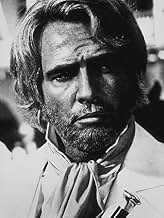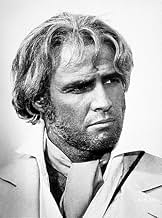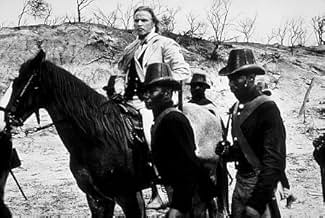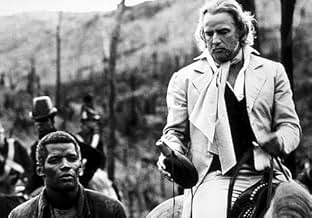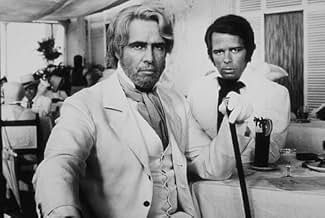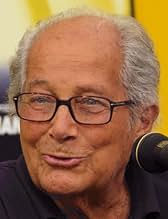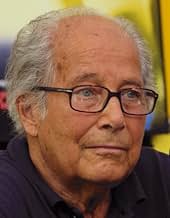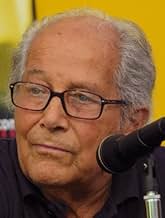In 1844, a British mercenary helps the revolting slaves of an Antilles island colony gain independence from Portugal, but later returns to hunt down a local rebel leader and former protégé.In 1844, a British mercenary helps the revolting slaves of an Antilles island colony gain independence from Portugal, but later returns to hunt down a local rebel leader and former protégé.In 1844, a British mercenary helps the revolting slaves of an Antilles island colony gain independence from Portugal, but later returns to hunt down a local rebel leader and former protégé.
- Awards
- 5 wins & 1 nomination total
- José Dolores
- (as Evaristo Marquez)
- Juanito
- (as Joseph P. Persaud)
- Soldier
- (as Alvaro Medrano)
- Engl. Major
- (as Alejandro Obregon)
- Lady Bella
- (uncredited)
- Man on the ship
- (uncredited)
- Ramón
- (uncredited)
Featured reviews
"Burn" begins in 1845 as Sir William Walker (Brando) arrives on the island of Queimada, truly as far as can be judged as a harmless traveler but actually an agent of the British government ordered to incite a revolution that will shatter the Portuguese control on the island and permit the British to put their hand on the valuable sugar-cane total product Queimada has a population of two hundred thousand, of whom only five thousand are Europeans The main town is a well-protected port with a fort and a garrison, a governor's palace, a cathedral, a bank, a hotel and a brothel
The English gentleman recognizes he must play the part of a political Pygmalion He looks around for a suitable subject to train as a revolutionary and he selects José Dolores (Evaristo Marquez), a large, handsome black dock-worker with an air of confidence Walker also recruits Teddy Sanchez (Renato Salvatori), an almost-white clerk with political ambitions Walker persuades José Dolores to steal the bank of the island, and once he does, Walker reveals his name to the government, thereby turning Dolores into a hunted bandit The ingenious Walker then teaches Dolores and his followers in the use of firearms and gradually absorbs in them ideas and feelings to overthrow the Portuguese government
The film is quite obviously political in tone, and is a passionate piece of propaganda in the anti-colonial struggle Brando's interpretation of Sir William Walker is apt to call up memories of his Fletcher Christian This is another Englishman, whose gentle speech and soft manners disguise with courage and determination Walker is not a villain but a cold, inflexible pragmatist with a hard work to accomplish
I have watched the film several times and loved Gillo Pontecorvo's direction of the scenes at the port, which are one of my favorite sequences in cinema. Pontecorvo wanted Brando to create an evil figure of "Sir" William Walker, who was a real person though not a British knight. He was an American mercenary who even went to Indo-China. Brando apparently argued with Pontecorvo that the character instead of a clear-cut evil figure should be more ambiguous and this led to major differences between the two. On viewing the film, it is evident Brando won the argument.
Franco Solinas, the screenplay writer, was a brilliant Leftist who contributed to Pontecorvo's success on "Battle of Algiers" and "Kapo." However, their films rankled the far Left and the far Right. Quiemada's script upset the Spanish government, and the filmmakers changed the details from a Spanish colony to a Portuguese colony. But Brando who probably was aware of the American connection of the lead character must have enjoyed the parallels of the story--knowing his personal love for the native Indian cause.
The film is a witty, cynical portrayal of colonial designs on impoverished poor. Sugar was the commodity in vogue then. A century later you could replace "sugar" with "oil." The film is replete with a brilliant speech penned by Solinas, spoken by Brando that begins by comparing the economics of having a wife versus a prostitute. He then ends the speech comparing the gains of a slave with that of hired labor. The political philosophy is unorthodox but hard hitting.
The visual effect of Brando's blonde hair and white clothes against the black natives is a visual metaphor. It is perhaps most anti-racist movie that I have seen with William Walker in all his glory unable to comprehend the political conviction and values of a native worker who refuses a chance to escape a cruel execution.
This film has a small but significant role for Italian actor Renato Salvatori.
I have seen hundreds of political movies--but this will remain my all time favorite. The film won Pontecorvo in 1970 the best director national award in Italy. The mix of Brando, Pontecorvo, Solinas, Salvatori and Morricone is a heady cocktail that will be a great experience for any intelligent viewer.
It is impressive the timing of director Gillo Pontecorvo to make and release "Burn!". In 1969, the South America was under military dictatorships promoted by the United States of America to improve their economical and political interests in the region. There are many parallel situations in the colonization process between what was happening in South America in that historical moment and in the fictitious island of Queimada in the previous century. Marlon Brando performs one of the most Machiavellians characters of the cinema history and very similar to the American advisors that supported the foregoing dictatorships (despite not using torture). His character is fascinating as well as his political capability to envision the consequences of his actions; he is indeed the personification of the thoughts and concepts of Machiavelli in "The Prince". My only remark is the use of English language in a Portuguese colony; Mr. Pontecorvo should have casted actors that speak Portuguese to be more accurate. My vote is eight.
Title (Brazil): "Queimada!" ("Burn!")
Did you know
- TriviaMarlon Brando once said this film contains "the best acting I've ever done."
- GoofsPortugal never had any colonies in the Caribbean. Its only American colony, Brazil, has no coast in the Caribbean.
- Quotes
Sir William Walker: Gentlemen, let me ask you a question. Now, my metaphor may seem a trifle impertinent, but I think it's very much to the point. Which do you prefer - or should I say, which do you find more convenient - a wife, or one of these mulatto girls? No, no, please don't misunderstand: I am talking strictly in terms of economics. What is the cost of the product? What is the product yield? The product, in this case, being love - uh, purely physical love, since sentiments obviously play no part in economics.
[general laughter]
Sir William Walker: Quite. Now, a wife must be provided with a home, with food, with dresses, with medical attention, etc, etc. You're obliged to keep her a whole lifetime even when she's grown old and perhaps a trifle unproductive. And then, of course, if you have the bad luck to survive her, you have to pay for the funeral!
[general laughter]
Sir William Walker: It's true, isn't it? Gentlemen, I know it's amusing, but those are the facts, aren't they? Now with a prostitute, on the other hand, it's quite a different matter, isn't it? You see, there's no need to lodge her or feed her, certainly no need to dress her or to bury her, thank God. She's yours only when you need her, you pay her only for that service, and you pay her by the hour! Which, gentlemen, is more important - and more convenient: a slave or a paid worker?
- Alternate versionsThe complete version of this film runs 132 minutes. A 112-minute version under the title "Burn!" was released in the USA and the UK.
- ConnectionsFeatured in Pontecorvo: The Dictatorship of Truth (1992)
- How long is Burn!?Powered by Alexa
Details
Box office
- Gross US & Canada
- $431,817
- Runtime2 hours 12 minutes
- Color
- Aspect ratio
- 1.66 : 1
Contribute to this page



